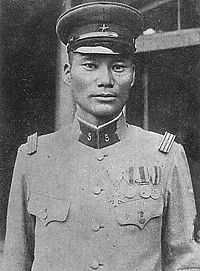Saburo Aizawa
From Wikipedia, the free encyclopedia
| Saburo Aizawa | |
|---|---|
 | |
| Born |
September 6, 1889 Iwate Prefecture, Japan |
| Died | July 3, 1936 (aged 46) |
Criminal penalty | Death |
Criminal status | Executed by firing squad |
Saburo Aizawa (Japanese: 相沢 三郎 - Aizawa Saburō) (September 6, 1889 – July 3, 1936) was a Japanese soldier born in Iwate Prefecture.
He reached the rank of Lieutenant-Colonel. He assassinated Tetsuzan Nagata with his sword on August 12, 1935, because he was reputedly putting the Army "in the paws of high finance". Aizawa made no attempt to resist arrest, and reportedly claimed that he "was in an absolute sphere, so there was neither affirmation nor negation, neither good nor evil." [1] After a high-profile trial, he was executed by a firing squad. Ironically, his actions helped bring Tōseiha faction, which he hated, absolute control over the Japanese Military.
See also
Notes
- ↑ Schoppa, R. Keith: East Asia: Identities and Change in the Modern World, Page 248. Pearson Prentice Hall, 2008.
|
This article is issued from Wikipedia. The text is available under the Creative Commons Attribution/Share Alike; additional terms may apply for the media files.